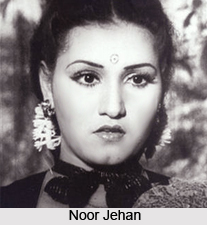 Noor Jehan was the adopted stage name for Allah Wasai. She was born on September 21, 1926 in Kasur, British India (now Pakistan). She is renowned as one of the most melodious singers of her time in the Indian subcontinent and was honoured as "Mallika-e-Tarranum", which in English means Queen of Melody.
Noor Jehan was the adopted stage name for Allah Wasai. She was born on September 21, 1926 in Kasur, British India (now Pakistan). She is renowned as one of the most melodious singers of her time in the Indian subcontinent and was honoured as "Mallika-e-Tarranum", which in English means Queen of Melody.
Early life of Noor Jehan
She was born in a family of musicians and was encouraged by her parents to follow in their musical footsteps and become a singer. However, she was more interested in acting in films and her works graced the earliest Pakistani films. She holds an astonishing record of 10,000 songs to her singing credits in various languages of Pakistan like Urdu, Punjabi and Sindhi languages. She was the first female Pakistani film director. Sonya Jehan is her granddaughter, who is also an actress currently working in Bollywood.
Noor Jehan was one of the eleven children of professional musicians Madad Ali and Fateh Bibi. Her family often performed at theatres; although only Wasai`s eldest sisters went on to pursue a career in acting. Two of her sisters, Eidan Bai and Haider Bandi, had been successful actors at the rural Taka Theatre in Lahore.
Career of Noor Jehan
Noor Jehan started singing at the age of five or six year`s old and showed varied styles, including traditional folk and popular theatre. Realizing her potential for singing, she was sent her to receive early training in classical singing under Ustad Bade Ghulam Ali Khan who was also a native of Kasur. There, she was instructed in the traditions of the Patiala Gharana of Hindustani classical music and the classical forms of thumri, dhrupad and khayal. The Punjabi musician Ghulam Ahmed Chishti noted Wasai only at the age of nine and composed some ghazals, naats and folk songs for her to perform. However, she was more interested in acting or playback singing.
Eventually her family shifted to Calcutta, (Kolkata) with the expectation to develop the movie careers of Wasai and her sisters. During their stay in Calcutta, the renowned singer Mukhtar Begum, encouraged Wasai and her two older sisters to join film and also recommended them to various producers. It was in Calcutta that Wasai received the stage name Baby Noor Jehan. Her older sisters were offered jobs with one of the Seth Sukh Karnani companies, Indira Movietone and they went on to be known as the Punjab Mail. Jehan later adopted Mukhtar Begum`s style of performance and sari attire.
Career as an Actress for Noor Jehan
In 1935, K.D. Mehra directed Pind di Kudhi and Noor Jehan acted along with her sisters in this film. Later, she also acted in films like Missar Ka Sitara (1936), Heer-Sayyal (1937) and others. She then recorded her first song for Dalsukh M. Pancholi`s movie Gul Bakavli, titled Shala Jawaniyan Mane.
In 1942, she played the main lead opposite Pran. Khandaan`s success compelled her to shift to Bombay, where she shared melodies with Shanta Apte in Duhai (1943). It was in this film that Noor Jehan lent her voice for the second time to actress named Husn Bano. In 1945, Jehan player the lead role in the movie Badi Maa alongside Lata Mangeshkar and Asha Bhosle. In 1945, she sung a Qawwali with Zohrabai Ambalewali "Aahen Na Bhareen Shikave Na Kiye", which was the first ever Qawwali recorded in female voices in subcontinent films. Mirza Sahibaan (1947), which starred Prithviraj Kapoor`s brother Trilok Kapoor, was the last film of Noor Jehan`s in India.
Career as a Singer for Noor Jeha
Noor Jehan sang 127 songs in only Indian films and she made 69 talking films from 1932 to 1947. Fifty-five of Noor Jehan`s films were made in Bombay (Mumbai), eight in Calcutta, five in Lahore and one in Rangoon, Burma. After Pakistan gained Independence in 1947, Jehan decided to move to Pakistan along with her husband Rizvi. She also made films in Pakistan, including Chanwey (1951), Dopatta (1952), Mirza Ghalib (1961) and so on. Noor Jehan made 14 films in Pakistan, four in Punjabi and ten in Urdu.
Awards and Honours for Noor Jehan
Noor Jehan received many awards, including with the highest Pakistani honour, Tamgha-e-Imtiaz (The Pride of Performance) in 1966. On December 23, 2000, Noor Jehan died from heart failure. Her funeral was arranged at Jamia Masjid Sultan, Karachi and she was buried at the Gizri Graveyard near the Saudi Consulate in Karachi.
Filmography of Noor Jehan
| Year | Film |
| 1939 | Gul Bakavli, Imandaar, Pyam-e-Haq |
| 1940 | Sajni, Yamla Jat |
| 1941 | Chaudhry, Red Signal, Umeed, Susral |
| 1942 | Chandani, Dheeraj, Faryad, Khaandan |
| 1943 | Nadaan, Duhai, Naukar |
| 1944 | Lal Haveli, Dost, Zeenat |
| 1945 | Zeenat, Gaon ki Gori, Badi Maa, Bhai Jaan |
| 1946 | Anmol Ghad, Dil, Humjoli, Sofia, Jadoogar, Maharana Pratab |
| 1947 | Mirza Sahibaan, Jugnu, Abida, Mirabai |
| 1951 | Chanwey |
| 1952 | Dopatta |
| 1953 | Gulnar, Anarkali |
| 1955 | Patey Khan, |
| 1956 | Lakt-e-Jigar, Intezar |
| 1959 | Nooran |
| 1958 | Choomantar, Anarkali |
| 1959 | Neend, Pardaisan, Koel |
| 1961 | Mirza Ghalib |